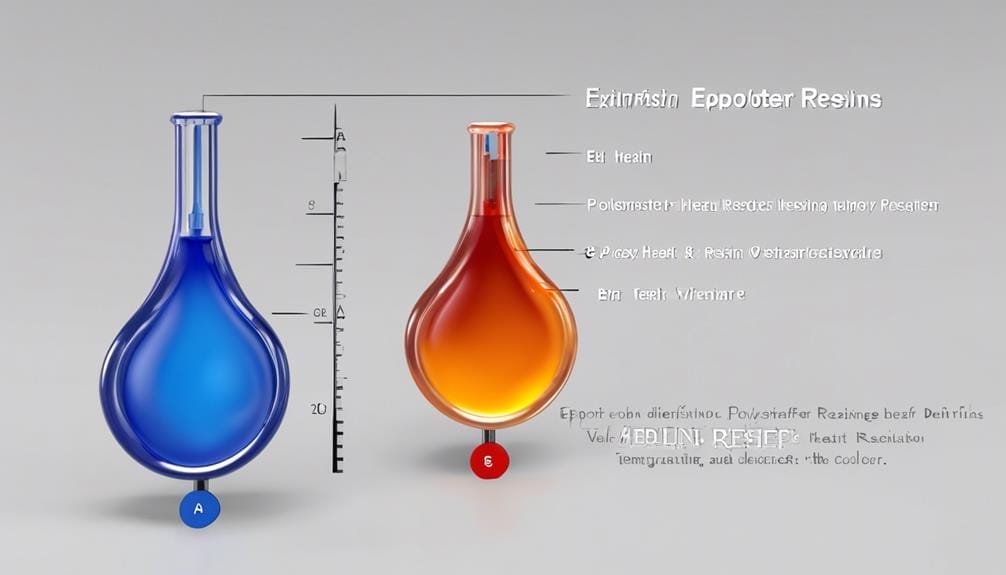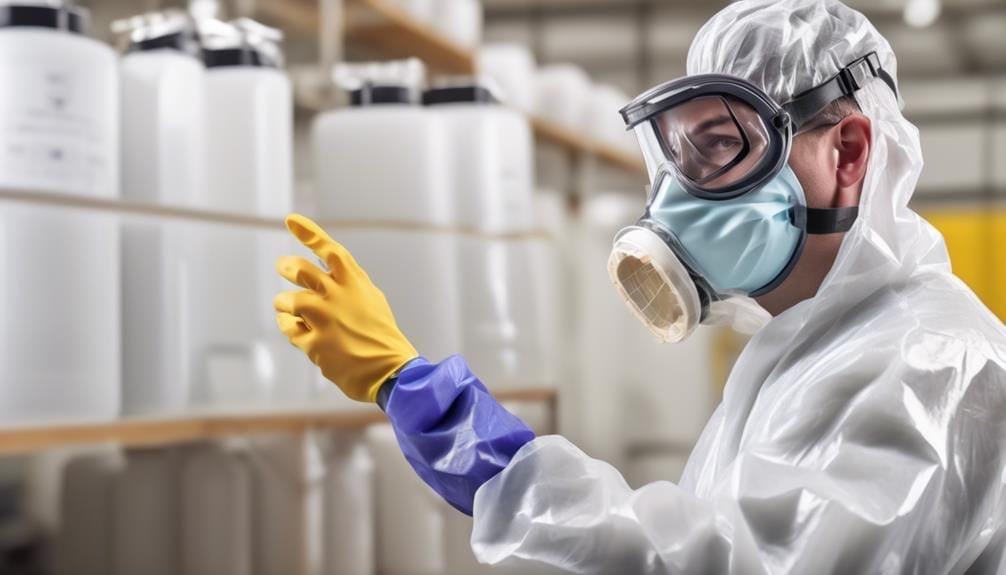Are you in the midst of a project that requires a strong and durable resin? If so, you may find yourself faced with the choice between epoxy and polyester resins.
While both have their merits, understanding their properties and differences is crucial in making an informed decision.
So, let’s dive in and explore the world of epoxy versus polyester resins and uncover which one is the perfect fit for your project.
Key Takeaways
- Epoxy resin offers exceptional adhesive properties, durability, and versatility compared to polyester resin.
- Epoxy resin is commonly used in chemical-intensive settings due to its resistance to a wide range of chemicals, while polyester resin has limitations in this regard.
- While epoxy resin is initially more expensive, it offers long-term cost savings due to its greater durability and is preferred for high-performance and longevity projects.
- Epoxy resin has superior durability and stress-handling capabilities, making it the preferred choice for high-impact resistance and long-term structural integrity.
Properties of Epoxy Resin
Epoxy resin boasts exceptional adhesive properties and durability, making it a highly sought-after material in industries such as aircraft components, boat building, and construction. Its unique properties make it a versatile choice for various applications.
When used with carbon fiber, epoxy resin creates strong, rigid, and lightweight structures, making it ideal for industrial and commercial flooring as well as the aerospace sector. Compared to polyester resin, epoxy resin has greater cure strength and can handle stress better, making it a preferred choice for long-lasting and high-stress applications.
One of the key advantages of epoxy resin is its minimal shrinkage. This property ensures a reliable and stable finish for various projects. Additionally, epoxy resin requires accurate measurement and mixing, but its superior bonding strength and flexibility make it an ideal choice for structural implications. The adhesive properties of epoxy resin allow it to bond well with a wide range of materials, including metals, plastics, and wood, further expanding its applications.
Furthermore, epoxy resin exhibits excellent chemical resistance, making it suitable for use in environments where exposure to chemicals is common. Its resistance to moisture and temperature variations also enhances its durability and longevity.
Properties of Polyester Resin
When considering the properties of polyester resin, three key points to focus on are strength and durability, chemical resistance, and cure time.
Polyester resin exhibits excellent strength and durability, making it suitable for applications where a high level of structural integrity is required.
Additionally, it has good resistance to a wide range of chemicals, making it suitable for use in environments where exposure to corrosive substances is a concern.
Strength and Durability
Polyester resin, despite its versatility, exhibits lower durability and strength compared to epoxy resin, making it more suitable for less demanding applications.
When it comes to strength and durability, epoxy resin outperforms polyester resin, especially in applications that require resistance to wear, damage, and stress. Polyester resin is more prone to damage from stress and wear, making it less durable in the long run.
In boat construction, where strength and durability are crucial factors, epoxy resin is the preferred choice due to its superior bonding strength and resistance to wear and damage.
Polyester resin may be suitable for temporary fixes or low-stress applications. Still, for long-lasting and durable repairs, projects demanding high strength and resistance to wear and damage should opt for epoxy resin.
Chemical Resistance
With its impressive chemical resistance, polyester resin proves to be an ideal choice for applications that involve exposure to various chemicals and acids in industrial settings. Polyester resin demonstrates better chemical resistance than epoxy resin in certain acidic and alkaline environments. Here are three advantages of polyester resin’s chemical resistance:
- Versatility: Polyester resin is highly versatile and can withstand a wide range of chemicals, including acids, alkalis, and solvents. This makes it suitable for use in storage tank linings, protective coatings, and other applications where exposure to harsh chemicals is a concern.
- Durability: The chemical resistance of polyester resin ensures its long-term durability in environments where other resin types may degrade or fail. It can withstand prolonged exposure to corrosive substances without losing its structural integrity.
- Cost-effectiveness: Polyester resin is generally more cost-effective than epoxy resin, making it a preferred choice for applications that require excellent chemical resistance without breaking the bank.
Despite these advantages, it’s important to note that polyester resin may not be suitable for all applications. It has limitations in terms of temperature resistance and may not be as strong or durable as epoxy resin in certain scenarios. Therefore, it’s crucial to carefully consider the specific requirements of your project before deciding on the resin type.
Cure Time
To achieve efficient project completion, it’s crucial to consider the cure time of polyester resin, as it offers a faster curing process compared to epoxy resin. Polyester resin typically has a shorter cure time, allowing for quicker completion of projects with tight deadlines.
The cure time of polyester resin can be adjusted by using a MEKP catalyst, providing flexibility in application. On the other hand, epoxy resin generally has longer cure times, but it can be formulated for use in extreme temperatures, which can affect the cure time.
It’s important to note that the cure time for both resins can vary depending on the formulation and temperature. The faster cure time of polyester resin in warmer temperatures can be advantageous for specific applications where time is of the essence.
Cost Comparison
When considering the cost comparison between epoxy and polyester resins, it’s important to analyze the potential long-term cost-effectiveness of choosing the former due to its superior properties and durability. While polyester resin tends to be cheaper initially, there are several factors to consider when evaluating the overall cost of a project.
- Initial Cost: Polyester resin is generally less expensive than epoxy resin, making it a more economical choice for certain projects. This lower upfront cost can be enticing, especially for those working on a tight budget.
- Durability: Epoxy resin offers greater durability and can handle stress better than polyester resin. This means that projects using epoxy resin may require fewer repairs or replacements over time, resulting in potential long-term cost savings.
- Project Scope: The scale and complexity of the project should also be taken into account. While polyester resin may be suitable for mass production and creating composite fabrics like fiberglass due to its lower cost, projects that require a higher level of performance and longevity may benefit from the use of epoxy resin.
Durability and Strength

When comparing the durability and strength of epoxy and polyester resins, it’s important to consider several material properties.
Epoxy resin demonstrates superior durability and can handle stress more effectively than polyester resin. This makes epoxy resin a preferred choice for applications that require high-impact resistance and long-term structural integrity.
In contrast, polyester resin may offer slightly better heat resistance but falls short in terms of fracture strain and overall strength.
Material Properties Comparison
Epoxy resin exhibits superior durability and exceptional stress-handling capabilities compared to polyester resin. When comparing the material properties of these resins, it becomes evident that epoxy resin offers distinct advantages in terms of strength and durability.
Here is a comparison of the two resins:
- Durability: Epoxy resin is known for its outstanding durability, making it suitable for applications that require long-lasting performance. Polyester resin, on the other hand, is less durable and may require more frequent repairs or replacements.
- Stress-handling capabilities: Epoxy resin has greater cure strength and can handle stress better than polyester resin. This makes it an excellent choice for high-stress applications such as aerospace or marine industries.
- Heat resistance: Although polyester resin has slightly better heat resistance than epoxy resin, epoxy resin still offers sufficient heat resistance for most applications.
Impact Resistance Differences
With its superior durability and impact resistance, epoxy resin outperforms polyester resin in terms of strength and durability, specifically in relation to the subtopic of ‘Impact Resistance Differences’ (Durability and Strength).
Epoxy resin is known for its exceptional ability to withstand high-stress applications. It’s highly resistant to impact, making it ideal for projects that require long-lasting and durable repairs.
On the other hand, polyester resin is more fragile and less impact-resistant compared to epoxy resin. It’s more prone to damage and is better suited for temporary fixes or low-stress use.
Epoxy resin’s superior resistance to wear and damage sets it apart from polyester resin, making it the preferred choice when durability and impact resistance are crucial factors to consider.
Longevity and Structural Integrity
Achieving long-lasting and structurally sound results is crucial in applications where durability and strength are paramount. When considering longevity and structural integrity, epoxy resin outperforms polyester resin, making it a more reliable choice for long-term use.
Here are three reasons why epoxy resin excels in these areas:
- Greater durability: Epoxy resin offers exceptional durability, making it highly resistant to wear and tear. This longevity ensures that structures made with epoxy resin will maintain their strength and integrity over time.
- Enhanced structural strength: The inherent strength of epoxy resin allows it to withstand higher levels of stress and strain. This means that structures made with epoxy resin can handle heavy loads and external forces without compromising their structural integrity.
- Long-lasting performance: Due to its superior durability and structural strength, epoxy resin provides long-lasting performance. This makes it the preferred choice for applications where longevity and reliability are crucial, such as in the construction, aerospace, and marine industries.
Heat Resistance

When considering heat resistance, it’s important to note that polyester resin has a higher heat limit compared to epoxy resin. Polyester resin can withstand temperatures of up to 176°F, while epoxy resin’s heat limit is 135°F. It’s crucial to understand that these limits refer to the temperature at which the resins start to degrade. Once both resins are fully cured, they perform well in terms of heat resistance.
Polyester resin’s higher heat limit makes it more suitable for applications where exposure to high temperatures is expected. However, it’s worth mentioning that the heat limit of polyester resin is rarely encountered naturally. In most cases, it’s the exothermic reaction during the curing process that determines the resin’s heat resistance.
Epoxy resin, on the other hand, has a lower heat resistance compared to polyester resin. This makes it less suitable for applications where high temperatures are a concern. However, epoxy resin offers other advantages, such as greater strength and chemical resistance.
When selecting between polyester resin and epoxy resin for specific applications, heat resistance should be considered as an important factor. If your project requires a higher heat resistance, polyester resin would be the better choice. However, if other factors like strength and chemical resistance outweigh the need for high heat resistance, epoxy resin may be the more suitable option.
Versatility and Repairability
After considering the heat resistance of epoxy and polyester resins, it’s essential to explore their versatility and repairability now. When it comes to versatility and repairability, epoxy resin offers a wider range of applications and repair options compared to polyester resin. Here are three key points to consider:
- Application Flexibility: Epoxy resin is highly versatile and can be used for repairs of both resin types, making it a preferred choice for various applications. Whether you need to repair a fiberglass boat, reinforce a wooden structure, or create intricate crafts, epoxy resin can handle the job. Its ability to bond with different materials and provide excellent adhesion makes it a go-to option for a wide range of projects.
- Durability and Strength: Epoxy resin has greater durability and can handle stress better than polyester resin. This makes it suitable for long-lasting repairs and applications that require strength. Its ability to withstand impact, heavy loads, and harsh environmental conditions makes it a reliable choice for structural repairs and industrial applications.
- User-Friendly Experience: Polyester resin isn’t recommended for sealing purposes due to shrinkage and residual odor, limiting its versatility compared to epoxy resin. Epoxy resin, on the other hand, is safer to work with and ensures a more user-friendly experience for repairs and various projects. Its low shrinkage and minimal odor make it easier to handle, providing a pleasant working environment.
Health and Safety Considerations

To ensure a safe working environment, it is crucial to consider the health and safety implications when using epoxy and polyester resins. Both resins have certain risks associated with them, but epoxy resin is generally safer to work with compared to polyester resin. Epoxy resin has lower skin irritation and allergic reaction potential, making it a more suitable choice for individuals with sensitive skin. However, it is still important to take proper safety precautions when working with both resins.
One of the main safety considerations when using epoxy and polyester resins is protecting the skin. Both resins can cause skin irritation and allergic reactions, although the severity differs. Epoxy resin has a higher potential for skin irritation and allergic reactions, while polyester resin is more likely to cause burns on the skin. Therefore, it is crucial to wear protective gloves and practice frequent hand washing to minimize skin contact.
In addition to protecting the skin, proper ventilation is essential when working with epoxy and polyester resins. Both resins release fumes and vapors that can be harmful if inhaled. Adequate ventilation, such as using a fume hood or working in a well-ventilated area, is necessary to prevent respiratory issues.
To summarize the health and safety considerations when using epoxy and polyester resins, refer to the table below:
| Consideration | Epoxy Resin | Polyester Resin |
|---|---|---|
| Skin Irritation | Lower Potential | Higher Potential |
| Allergic Reactions | Lower Potential | Lower Potential |
| Burns on Skin | Less Likely | More Likely |
| Inhalation Risks | Yes | Yes |
| Ventilation Requirements | Yes | Yes |
Chemical Resistance
Considering the health and safety implications discussed earlier, let’s now explore the chemical resistance properties of epoxy and polyester resins.
When it comes to chemical resistance, epoxy resin outperforms polyester resin. Here are three key points to understand about the chemical resistance of these resins:
- Superior Resistance: Epoxy resin exhibits higher resistance to a wide range of chemicals compared to polyester resin. This makes epoxy resin suitable for applications in harsh chemical environments where exposure to corrosive substances is a concern. Its ability to withstand chemical damage ensures durability and longevity in such settings.
- Susceptibility to Degradation: Polyester resin, on the other hand, may experience degradation and damage when exposed to certain chemicals. This limitation restricts its use in chemical-intensive settings where it may not be able to withstand the corrosive effects of specific substances. Therefore, polyester resin isn’t the preferred choice when superior chemical resistance is required.
- Industrial and Commercial Applications: Due to its exceptional chemical resistance, epoxy resin finds extensive use in industrial and commercial settings where exposure to chemicals is a common occurrence. Its ability to resist corrosion and damage from various substances makes it a reliable choice for applications such as chemical storage tanks, pipelines, and chemical processing equipment.
Choosing the Right Resin for Your Project

When selecting a resin for your project, it’s important to carefully consider the specific requirements and characteristics needed to ensure optimal performance and durability. Both epoxy and polyester resins have their advantages and limitations, so it’s crucial to choose the right resin based on your project’s needs.
If you’re looking for a resin that’s cost-effective and commonly used in lay-up processes for creating composite materials like fiberglass, polyester resin may be the right choice for you. It’s cheaper than epoxy resin, especially for mass-production projects.
However, if durability and stress handling are your priorities, epoxy resin is the way to go. It has greater cure strength and can handle stress better than polyester resin, making it more suitable for long-lasting and durable projects.
Another aspect to consider is heat resistance. Epoxy resin has a higher heat limit of about 135°F, while polyester resin has a limit of about 176°F. Both resins perform well in terms of heat resistance once cured, so choose the resin that aligns with your project’s temperature requirements.
Frequently Asked Questions
Is Polyester Resin Better Than Epoxy Resin?
Polyester resin is not necessarily better than epoxy resin. When comparing cost, durability, strength, and eco-friendliness, epoxy resin often comes out on top. Additionally, epoxy resin offers greater versatility in its applications.
What Are the Disadvantages of Polyester Resin?
Polyester resin has several disadvantages. Its toxicity can be harmful to your health. It is prone to shrinkage and yellowing over time. Additionally, it can become brittle, making it less durable for certain applications.
What Is the Difference Between Epoxy and Synthetic Resin?
Epoxy resin and synthetic resin have distinct differences. Epoxy resin offers advantages like superior bonding strength, moisture resistance, and durability. Its applications include sealing finishes and high-performance uses. The curing process involves a chemical reaction between resin and hardener.
What Are the Major Disadvantages of Epoxy Resin?
The major disadvantages of epoxy resin include toxicity concerns, long curing time, and high cost. It is important to handle epoxy resin with caution due to its potentially harmful fumes. Additionally, the curing process can take a considerable amount of time, which may delay project completion. Lastly, epoxy resin tends to be more expensive compared to other resins, making it less cost-effective for certain applications.
Conclusion
Based on the properties discussed, epoxy resin is the clear winner when it comes to moisture resistance, durability, strength, heat resistance, versatility, repairability, and chemical resistance.
Although polyester resin may be a more cost-effective option, it lacks the long-term performance and reliability of epoxy resin.
Therefore, for any marine applications or projects where moisture resistance is crucial, epoxy resin should be the resin of choice.
Make the right decision and ensure the success and longevity of your project with epoxy resin.





